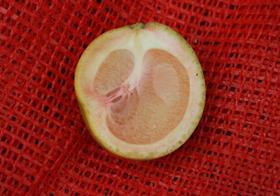
Citrus growers in the US states of California and Arizona have welcomed the recent introduction of federal legislation designed to aid, through research, the industry's ongoing battle against invasive pests and diseases.
In a joint statement released by key industry groups including the Citrus Research Board, California Citrus Mutual, the California Citrus Quality Council and Sunkist Growers, it was confirmed that the bill would divert a portion of federal tariff revenue derived from imported citrus products, including fresh fruit and frozen concentrate citrus juice products, to finance the Citrus Disease Research and Development Trust Fund.
The groups also expressed their appreciation for the efforts of a number of US senators from both the Democratic and Republican parties, which they said had ensured the legislation's speedy introduction and passage through the US Congress.
'The citrus industry owes a debt of gratitude to the sponsors of the bill, including Senator Dianne Feinstein, Senator Bill Nelson and Senator John Cornyn,' said Claire Smith of Sunkist. 'We are grateful to the bill's sponsors for their bipartisan efforts to protect the nation's major citrus-producing states.'
The most recent, and most deadly, threat on California's horizon comes from Huanglongbing (HLB), a devastating disease known more commonly as citrus greening (see picture), for which there is said to be no known remedy.
The disease is spread by an otherwise harmless carrier, a small imported pest known as the Asian citrus psyllid (ACP).
HLB, which is not native to the US, was first discovered in Florida in 2005 and, according to industry leaders, is already threatening to wipe out the state's citrus industry.
The disease is now found in all 32 of Florida's commercial citrus producing counties, where it is attacking the trees' vascular system and eventually killing them.
While the psyllid is now also present in California, Arizona and Texas, having come across the border from infected areas in Mexico, no HLB has yet been detected on trapped psyllids or in trees.
The establishment of the trust fund is therefore being seen as an important tool in combating the theat.
'Our US$1.8bn industry creates another US$1.2bn in economic activity and supports 10,000 employees with another 12,000 dependant on citrus production for their employment in transportation, exports and other ancillary activities,' said California Citrus Mutual president Joel Nelsen.
'This proposed trust fund can create the research necessary and provide solutions where none exist to sustain this vital economic engine in California. We are very grateful to the Senator for being a willing partner in this effort,' he added.
Funding provided by the legislation is set to be distributed to research projects working on finding remedies for HLB and ACP.
Citrus growers themselves, meanwhile, have already committed millions of dollars to researching the disease and its carrier.
'These additional funds are desperately needed to augment the millions of dollars currently being contributed by the citrus growers,' said Ted Batkin, president of the California Citrus Research Board. 'Citrus growers are fighting for their livelihoods and we are grateful for the help in protecting an essential US industry.'






No comments yet